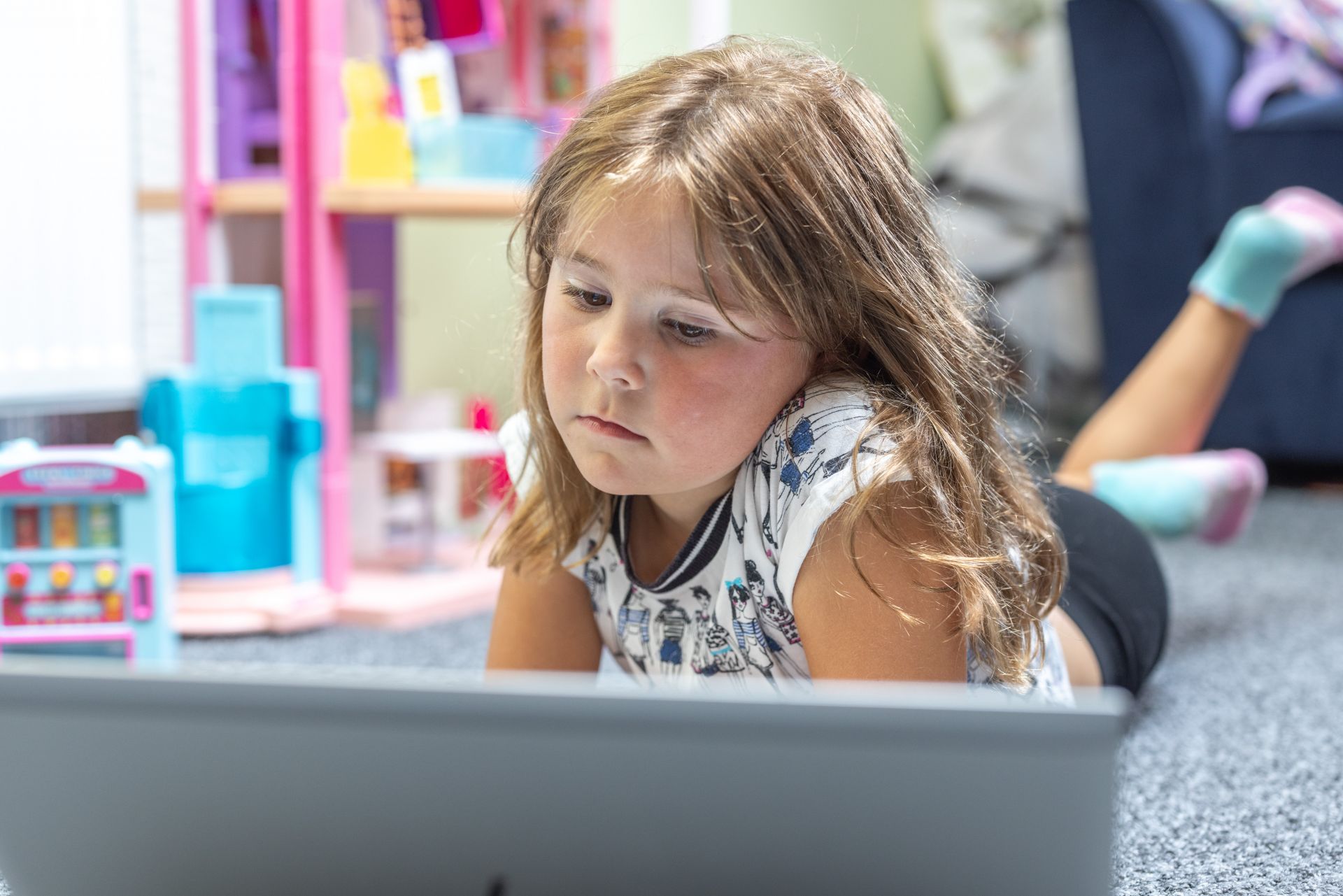
Article September 18, 2023
School phobia: A guide for worried parents | Empowering Families
School phobia is a complex challenge, but it’s one that affects countless families every year. If your child is feeling anxious, fearful, or stressed about going to school each day, you’re not alone.
At King’s InterHigh, we’ve supported numerous families with children who suffered from a phobia of school. Take mum Alison for example, whose 15-year-old daughter began experiencing anxiety from the age of seven. By the Year 10, that anxiety had become so severe that Alison’s daughter struggled to attend school at all — on top of trouble eating, socialising, and sleeping. “As parents, we were in despair and desperate for some help, support, compassion, understanding, and guidance,” says Alison. “Our daughter was declining at an alarming rate… and we could no longer get her into school at all.”

Advice from Ray Boxall, Head of SEN Services at King’s InterHigh
Alison’s story echoes the experience of numerous parents grappling with their child’s school phobia, particularly since the pandemic. In fact, a 2022 survey by the National Association of Head Teachers found that a staggering 95% of school staff had seen an increase in pupil anxiety since the pandemic.
That being said, school phobia isn’t a hopeless situation. Thankfully, once you understand the problem, there are many ways to tackle it and get your child feeling happy and confident again.
For all the guidance you need, take a look at our rundown of what school phobia is, how you can spot it, and step-by-step strategies to get on top of the problem — including the possibility of alternative education options.
What is school phobia?
In a nutshell, school phobia is an intense fear of attending school. Typically, children who have this phobia experience severe anxiety or panic when faced with school-related situations, from arriving in the morning to attending classes. While occasional nervousness around school is a normal part of childhood development (for example, nerves around exams or worries after arguing with a friend), a true phobia of school can severely impact a child’s education and overall wellbeing.
School phobia vs. school refusal
While the terms “school phobia” and “school refusal” are often used interchangeably, they can also describe two different concerns.
- School phobia itself is simply a term to describe the fear of school, and children can experience that fear while still attending school everyday. The term “school anxiety” can also be used in the same way.
- School refusal, on the other hand, refers to children who won’t attend school, whether frequently or completely. This is often caused by school phobia or anxiety, but the two can happen independently of each other.
- While “school refusal” is one of the most commonly used terms you may see from organisations like the NHS, it’s worth noting that many families prefer the term “school avoidance” or as a way of reframing the issue. To many, “refusal” implies a conscious choice, when in reality, many children with school phobia feel controlled by their emotions. When talking to educational professionals, you might also hear the terms “emotionally based school avoidance” or “emotionally based school non-attendance” (EBSA or EBSNA) as a way to describe this.
If your child is already not attending school due to fear or anxiety, take a look at our more specific advice on school avoidance.

The signs of school phobia
School phobia doesn’t always manifest as a complete refusal to leave home in the mornings, so it’s important to recognise the earlier signs and symptoms so you can support your child before they start missing school.
Signs of school phobia can present in a variety of ways.
Physical symptoms
- Complains of headaches, stomach aches, and nausea on school days
- Panic attacks or difficulty breathing when talking about or preparing for school
- Trembling, sweating, or feeling dizzy in the morning
Behavioral signs
- Morning crying or meltdowns
- Resistance to getting out of bed on time
- Begging or pleading to stay at home
- Frequent visits to the school nurse to try to go home early
- Skipping classes or entire school days
- Acting out at home or at school
Emotional signs
- Excessive worry about safety at school or separation from parents
- Intense fear or panic when discussing school-related topics
- Difficulty sleeping the night before school days
- Irritability or mood swings, particularly before or after school
- Withdrawn or depressed demeanor
Noticeable changes
- Struggling with homework or sudden disinterest in schoolwork
- A noticeable drop in grades or academic performance
- Sleep disturbances, such as insomnia or nightmares
- Changes in eating habits, either loss of appetite or overeating
Your child may be struggling with school phobia even if they don't completely refuse to attend altogether. Look out for signs like crying, meltdowns, or unexplainable complaints of illness before school, as well as behaviour changes like trouble sleeping or a drop in grades.
What causes school phobia?
Before you can support your child through school phobia, you’ll need to know where it’s coming from. That can be tricky, because there are numerous common triggers behind a fear of school. These causes can be sudden or gradual, and you may be surprised to learn that they’re not all directly school-related.
School-related causes
- Academic pressures like poor test results, difficulty keeping up in class, or a high-stakes school environment
- Bullying, trouble making friends, and other social challenges
- A fear or dislike of specific teachers or staff
- Fears of specific activities that happen in school, like getting changed for PE or answering questions in front of the class
- A feeling of overwhelm in the busy school environment, often when moving from primary or elementary school to secondary or high school
- Going back to school after the summer break
Personal causes at home
- Conflicts with parents or siblings
- An illness or loss in the family, including the loss of a pet
- Major life changes like moving house or having a new sibling
- A general separation anxiety and sense of worry about being away from parents or caregivers
- Moving to a new school
- Broader personal worries about societal issues like school safety, the pandemic, and more
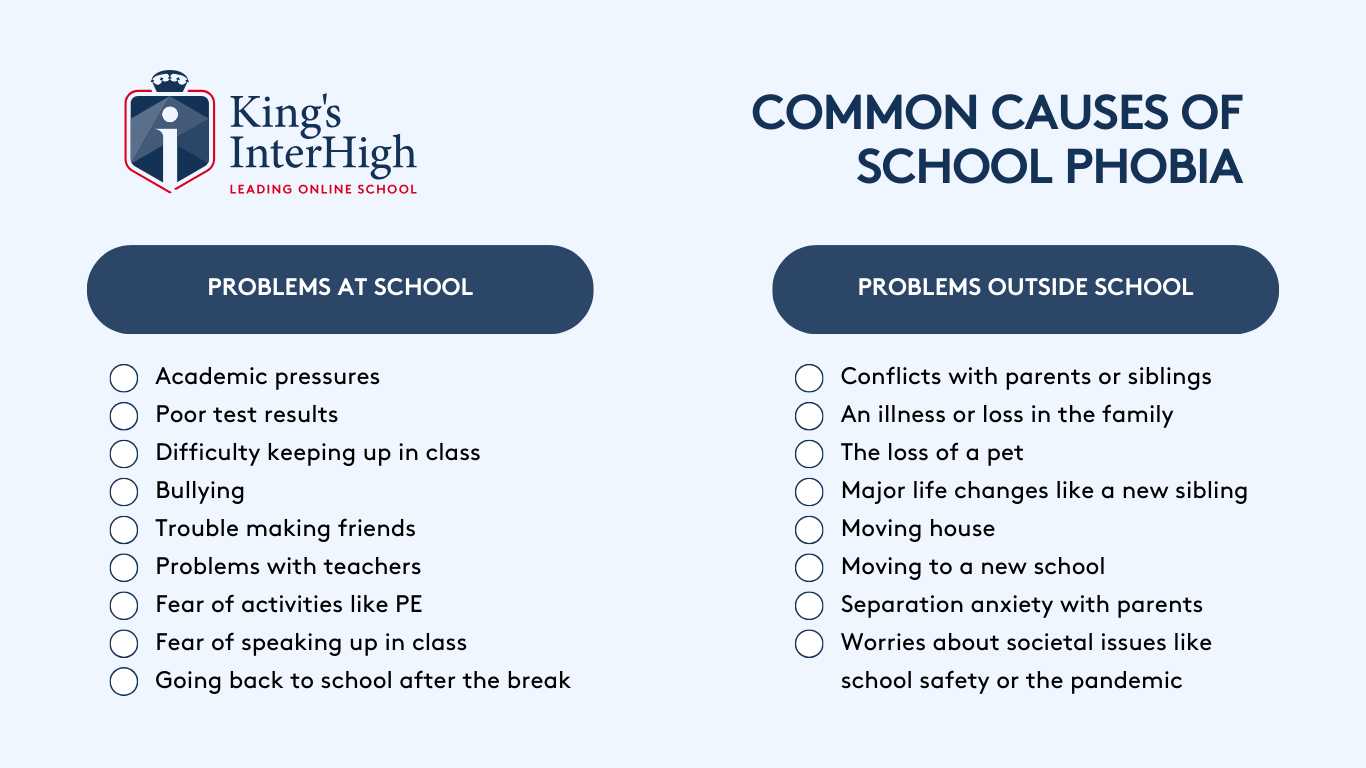
SEND and school phobia
On top of this, children with special educational needs or disabilities (SEND) are more susceptible to experiencing a phobia around school.
Many of our King’s InterHigh students with autism, ADHD, and similar neurodivergences or learning differences have struggled with anxiety around the school environment. They may experience sensory overload in the classroom, or they might not be getting the right support for their needs, which can lead to a worry about falling behind.
Similarly, children who already have a diagnosis of anxiety (such as social anxiety, GAD, or panic disorder) may find that their worries are exacerbated by the school environment. Other mood disorders, such as depression, can also impact a child’s ability to cope with the usual stresses of school.
School phobia is often caused by problems at school, such as bullying or poor grades, but it can also be triggered by problems at home, like the loss of a family member or a recent move.
The impacts of fearing school
What can happen if a child’s school phobia is left unaddressed? Naturally, the most obvious consequence is school avoidance: many children who are anxious about school may struggle to attend at all.
That’s not the only consequence, however. Even if your child is still attending school, if they’re spending the day consumed by fear and anxiety, they may start to fall behind, miss homework assignments, and develop negative relationships with their teachers. School phobia can also impact your child’s ability to socialise comfortably, which means they may have trouble making or keeping friends, or may even lash out and have arguments within their friend group.
And, perhaps most importantly, a persistent phobia of school can have significant effects on your child’s overall mental health and wellbeing. Many students who fear school develop a sense of low self-esteem or inadequacy, and may start to become anxious about other areas of life (like friendships).
If you’re seeing signs of a school phobia in your child, working through the steps below will help your family make positive progress.
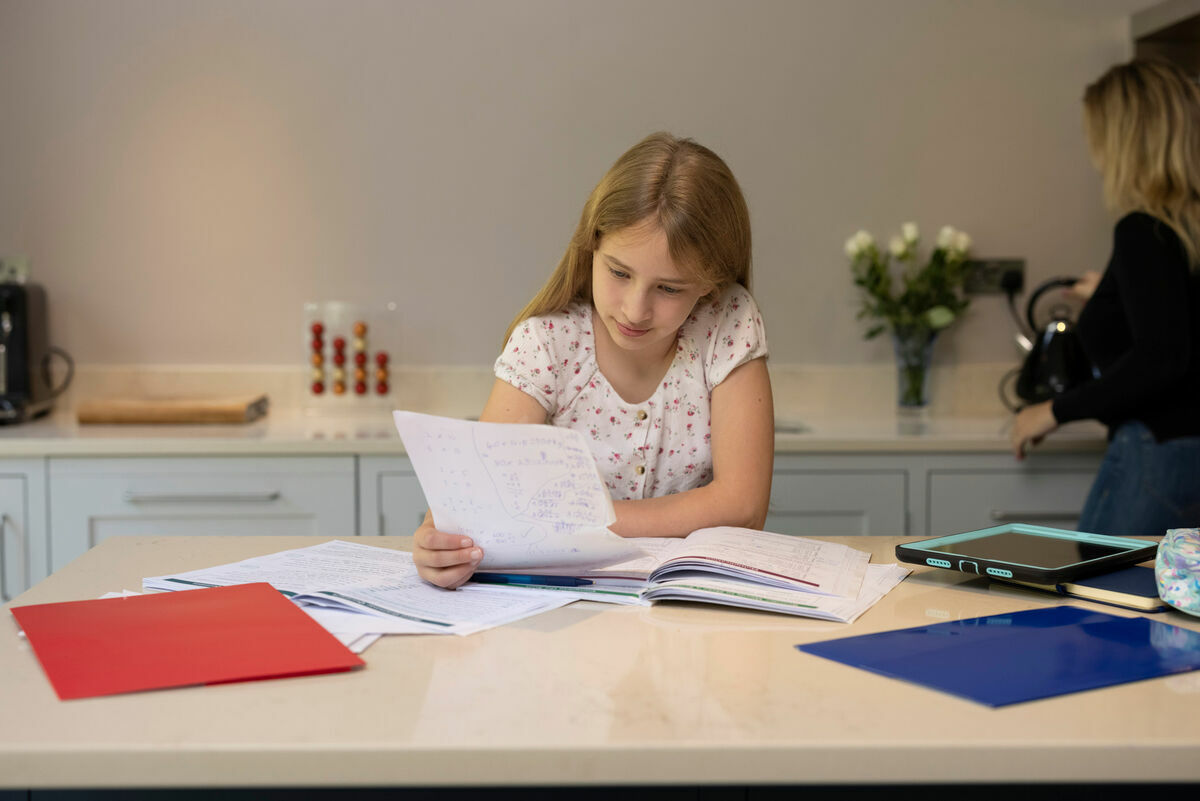
Step by step: What to do if your child has school phobia
Getting on top of your child’s school phobia can have a remarkable impact on their academic achievement, their daily life, and their happiness and confidence.
Based on our decades of experience with families going through similar challenges, here are the six steps we’d recommend trying.
1. Recognise and document the signs
As mentioned, the first step to getting on top of school phobia is recognising the signs — and be sure to document them too. Keeping a running log of any signs, symptoms, or changes you’ve noticed will help you when it comes to opening a dialogue with your child or talking to their school.
2. Talk to your child to identify the problem
While it isn’t always easy to get a child to open up about their fears and anxieties, an open and honest talk is a crucial part of getting them the right support.
Try to create a safe, non-judgmental space for your child to express their feelings in a way that works for them. For some children, this might be a simple chat at home. Other children, especially neurodivergent students, may prefer to express what they’re going through via written words, art, or role play. Allowing your child to express themselves in the way they’re most comfortable can be key to getting an accurate picture.
3. Brainstorm solutions and strategies at home
In many instances, once you know where your child’s phobia is stemming from, you’ll find there’s a lot you can do at home to help them cope with and overcome their fears.
This may be a case of addressing the root cause. For example, if your child is worried about going to school while a family member is sick, it may help to explain any treatments they’re going through to keep them healthy. Alternatively, you may need to look at coping mechanisms to help with intermittent worries. If your child gets overwhelmed by a long school day, they may benefit from taking some time to themselves during their lunch break to do deep breathing exercises. If they’re down about their grades, positive self-talk can be a big help.
For younger children, consider also using tools like "worry boxes." Worry boxes are a way for your child to write down or draw their concerns and symbolically "leave" them at home. For older children, apps focused on mindfulness or anxiety management can be helpful in combination with the talks you're having at home.
4. Talk to your child’s school about support
If home-based solutions aren’t working, or if your child’s anxiety is caused by a fixable issue at school, the next step is to arrange a meeting. Get together with your child’s teacher, special educational needs coordinator (SENCo), or pastoral lead, and present them with the list of challenges and symptoms you’ve already documented.
It’s important that your child, your family, and the school are on the same page, so you’ll want to go into your meeting and collaborate with them to devise the right plan. That could be something like a buddy system for your child or a safe space for them to go when they’re overwhelmed. Where applicable, any support adjustments should documented in Individual Education Plans (IEPs) or Education, Health, and Care Plans (EHCPs) to make sure they’re well followed.
5. Check in on progress regularly
Whether your child is applying strategies they’ve learned at home or following supports provided by the school, don’t forget to check in on how they’re progressing regularly. You might want to have weekly talks, or you might find better success with a physical aid like a mood tracker or anxiety scale.
This also gives you the opportunity to adjust your approach if strategies haven’t been working. And, remember to celebrate small victories and improvements, no matter how minor they might seem. This positive reinforcement can boost your child’s confidence and motivation to continue facing their phobia head-on.
6. Consider a medical professional’s advice
Remember that some phobias and anxieties are best dealt with by a medical professional. If your child’s school phobia persists despite your efforts, or if it’s significantly impacting their daily life, it may be time to book an appointment with your child’s GP.
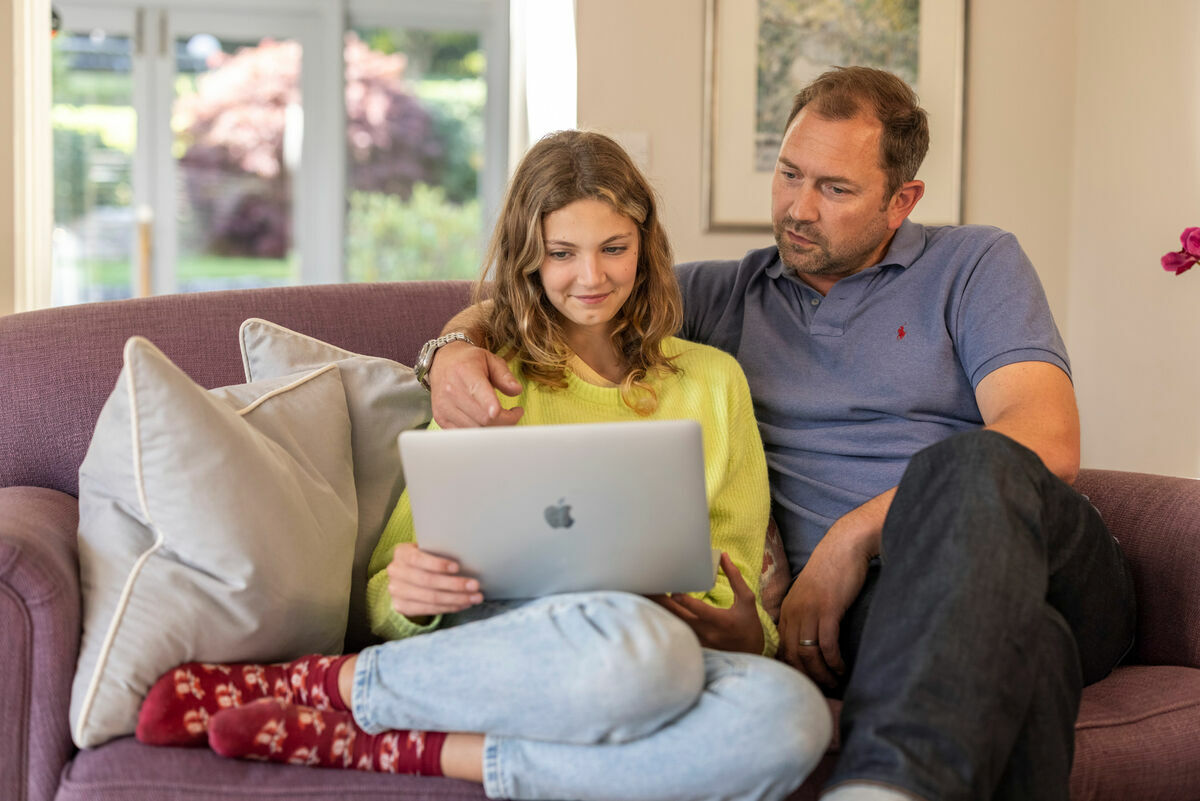
What if your child is still scared and anxious?
If you’ve already tried the strategies above without any success, remember that you’re not alone and it’s not your fault. For some children, the traditional school setting poses difficulties that even the most helpful of teachers may struggle to find workarounds for.
It is, of course, essential and legally mandatory that your child receives an education, even if they’re too scared to go to school. However, if you’re in the UK or many other countries worldwide, a great education can also come in the form of home education or online school.
Online school for children with school phobia
For Alison and so many parents like her, the best way forward from school-related anxiety was moving to a more fitting online school setting. When asked about her daughter’s experience with King’s InterHigh, the leading British international online school, Alison gushed, “She was laughing, smiling, engaging, and singing with happiness again. The beautiful child we felt we’d lost was returning!”
Why can online school be a better fit? That all depends on why a child is struggling with school phobia or school avoidance to begin with, but at King’s InterHigh, families have found a huge range of strengths and advantages.
- A comfortable environment: With online learning at King’s InterHigh, students can attend live, interactive online classes with teachers and classmates, all from the comfort of home: distraction-free, with a zero-tolerance policy for bullying.
- A smooth transition process: Students can join us at any time stress-free thanks to our warm induction process, which includes welcome sessions and school walkthroughs.
- Flexible learning: With recordings of all lessons available 24/7 at King’s InterHigh (plus our AI-powered personalised learning pathways), students can study at their own pace without worrying about falling behind the rest of the class. Our innovative learning model also uses a variety of techniques and technologies (like VR) to help students learn in the best way for them.
- Support for wellbeing: Wellbeing is our priority at King’s InterHigh, which is why our dedicated pastoral team are always on hand to provide comprehensive wellbeing support — from weekly tutor group sessions to anxiety workshops.
- Social opportunities: For students who have been anxious about school due to struggles making friends, we offer a huge range of online and in-person social options, from tight-knit clubs to school-wide events to trips and meetups.
Recent research conducted by Cambridge University has highlighted the impact COVID-19 had when education was forced to go online, and how these changes have created a positive long term impact. You can read more about this research here.
Find out more
If you’re interested in learning more about how King’s InterHigh’s school environment can be a perfect fit for children who have anxieties in the traditional classroom, get in touch with our friendly team.
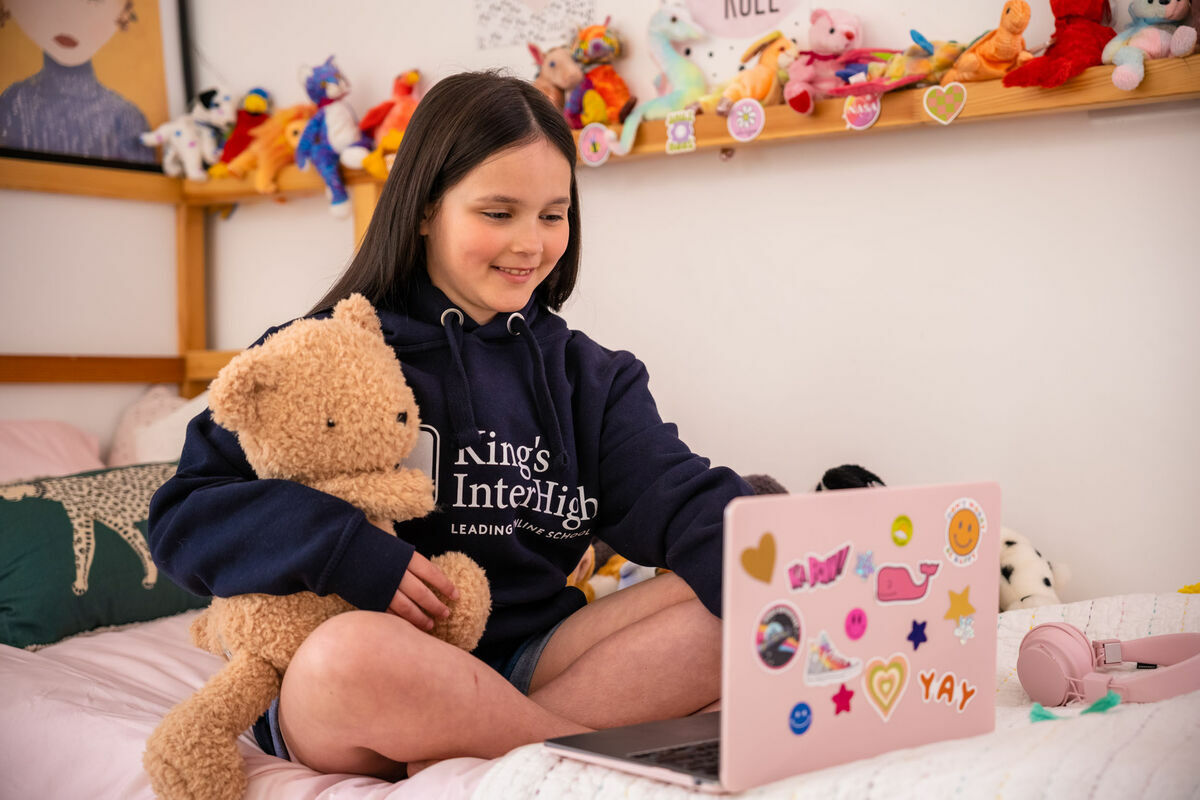
Helpful resources
For more expert information and advice, take a look at the following resources:
NHS Fife: School refusal / reluctance to attend school
Action for Children: School refusal and Emotionally Based School Avoidance (EBSA)
BBC Bitesize: School anxiety and refusal: How parents can help their child get through tough times
Frequently asked questions (FAQs)
What is a school phobia called?
School phobia is also known as "scolionophobia" or school-related anxiety, though school phobia is an acceptable term on its own.
Is school phobia a real thing?
Yes, school phobia is sadly a real concern that affects many children and teenagers. More than just a dislike of school, it's an intense fear or anxiety similar to common phobias such as acrophobia (fear of heights). While not classified as a separate disorder in the Diagnostic and Statistical Manual of Mental Disorders (DSM-5), it's often considered a symptom of other anxiety disorders.
Is school phobia a medical term?
While "school phobia" is widely used and understood in schools and medical settings, it is not a formal medical diagnosis or a distinct disorder in the Diagnostic and Statistical Manual of Mental Disorders (DSM-5). The term is often used descriptively to explain a cluster of symptoms related to intense anxiety about school attendance.
What age does school phobia start?
School phobia can develop at any age, but it may be more likely to emerge at critical periods. For example, children may start to fear school when they first start attending at the age of around 3 to 5 years old. Another peak period is the transition to secondary school, at aged 11 in the UK. Some children may experience school phobia from a very young age, while others might not develop it until their teenage years, particularly when examinations become more crucial.
What can I do if my child refuses school?
If your child is refusing to attend school, take a look at our guide on school avoidance.
How can school phobia be treated?
There are a range of potential treatments for persistent school phobia that can't be managed at home; one example is CBT, or cognitive behavioural therapy. If you think your child may need a professional intervention for their fear and anxiety, get in touch with your GP for accurate advice and next steps.
How can you get over your own school phobia?
If you're struggling with school phobia yourself, the best first step is to talk to your parents or teachers. They'll be able to offer you an understanding ear and help you start to work out why you're anxious and how you can overcome your fears. Remember, lots of kids and teens feel nervous about school sometimes, and it's completely okay to ask for help.




















